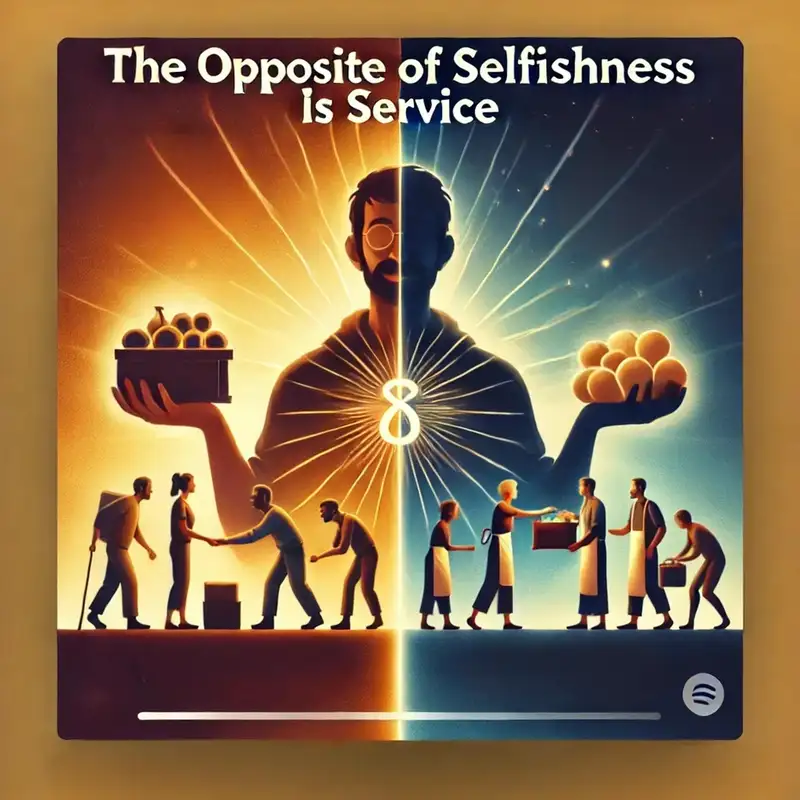The Opposite of Selfishness is Service(From our 1-5-25 worship)
1. Introduction: Bernie Madoff and the Problem of Selfishness
- The sermon opens with the story of Bernie Madoff—a once-respected figure in the stock market world (even serving as chairman of the NASDAQ) who orchestrated one of history’s largest Ponzi schemes.
- Despite having ample knowledge and opportunities to succeed legitimately, Madoff chose to deceive investors, using new clients’ money to pay off earlier ones. This fraud continued for decades until the financial crisis of 2008 exposed it.
- Madoff’s downfall is framed as an example of greed and selfishness. The preacher notes how easy it is to judge someone who stole billions of dollars, but then poses the question: “Is his selfishness really worse than ours just because it has more zeros attached to it?” This prepares the congregation to examine selfishness on a more personal level.
2. Mark 10 and the Rich Young Ruler: “What Must I Do?”
- Mark 10:17–22 tells the story of the rich young ruler who approaches Jesus, asking, “Good teacher, what must I do to inherit eternal life?”
- Jesus responds by reminding him of the commandments—do not murder, do not commit adultery, etc.—which the ruler claims to have kept since youth.
- In a moment of deep compassion, Jesus looks at him “and loves him,” then delivers a challenging command: “Sell all that you have and give to the poor… and come, follow Me.”
- The man walks away “disheartened” (the preacher emphasizes how this suggests an emotional and spiritual anguish). He focuses on what he stands to lose rather than what he could gain—heavenly treasure and a closer relationship with Christ.
- The key lesson here is that selfishness narrows our vision so that we see only our own sacrifice or loss, not God’s promise of something greater.
3. The Disciples’ Reaction: Pointing Fingers at “Them” and “Us”
- In Mark 10:23–27, Jesus turns to His disciples and comments that it is difficult for the wealthy to enter the Kingdom of God. They are amazed (possibly shocked or confused) by this statement.
- Jesus then shifts His language, addressing them as “children,” indicating that everyone—not just “rich people”—struggles with selfishness.
- The disciples, feeling unsettled, ask, “Then who can be saved?” Jesus replies that with man it is impossible, but not with God, reaffirming that salvation is ultimately God’s work.
- The preacher highlights how the disciples initially see wealth as the problem of “those people,” but Jesus makes it clear that all of us face the same heart-issue of self-centeredness.
4. Sacrifice and Reward: “We Have Left Everything…”
- Next, Peter speaks up: “We have left everything and followed you” (Mark 10:28). Indeed, the disciples gave up their livelihoods (fishing nets, tax-collection booths) to follow Jesus.
- Jesus reassures them: “No one who has left house or brothers or sisters or mother or father or children or lands for My sake… will fail to receive a hundredfold now in this time… and in the age to come eternal life” (Mark 10:29–30).
- The preacher explains that this “hundredfold” reward is both future (eternal life) and present (the blessings of Christian community).
- For instance, if you are in need (e.g., your heat goes out or you need a place to stay), your brothers and sisters in Christ open their homes. This is how we gain “many houses” and “many brothers and sisters”—through mutual support.
- Christians share resources, responsibilities, and care for one another, exemplifying service and generosity over selfishness.
5. An Inopportune Request: James and John Seeking Status
- Immediately after Jesus predicts His suffering and death (Mark 10:32–34), James and John approach Him with a starkly selfish request: “Grant us to sit, one at Your right hand and one at Your left, in Your glory” (Mark 10:35–37).
- This moment seems particularly insensitive—Jesus has just revealed He will be delivered up, mocked, and killed, yet they are preoccupied with securing positions of honor.
- Their behavior highlights the pervasive nature of selfish ambition, even among those closest to Jesus. The other disciples become indignant, possibly because they, too, desire those top spots or are appalled that James and John would ask first.
6. Jesus’s Core Teaching: “Whoever Would Be Great Must Be Your Servant”
- Jesus does not dismiss them but uses this as a teaching moment. In Mark 10:42–45, He contrasts worldly power structures (“rulers of the Gentiles lord it over them”) with God’s Kingdom, where greatness is defined by service.
- “Whoever would be great among you must be your servant,” and “whoever would be first… must be slave of all.”
- Jesus is the ultimate example: “For even the Son of Man came not to be served but to serve, and to give His life as a ransom for many.”
- This is the pivotal point of the sermon: the true opposite of selfishness is not merely thinking humbly of oneself, but actively serving others.
7. Practical Implications: Overcoming Selfishness Through Service
- The preacher then applies these lessons to the congregation’s context, looking ahead to the year’s opportunities.
- If they do not step out in service, the only barrier is their own selfishness—focusing too much on personal comfort, resources, or ambitions.
- The call is to “stand on the gas pedal” and move forward, encouraging one another, sharing possessions, giving time and energy, and collectively building up the body of Christ.
- When God’s people serve rather than hoard, the church community thrives, and it becomes a “home” where everyone’s needs are met.
8. Conclusion: A Call to Respond
- The sermon ends with an invitation to reflect on personal struggles with selfishness—whether large or small—and to turn to God for help in breaking free from it.
- The congregation is reminded that God loves them and they are surrounded by supportive brothers and sisters in Christ.
- The final challenge: Will you choose to serve rather than be served? Will you focus on what you can give rather than on what you stand to lose?
Key Takeaways
- Selfishness is universal: It appears in grand-scale crimes (Madoff) and in day-to-day attitudes (like the disciples).
- Selfishness distorts our vision: We worry about loss instead of recognizing God’s promise of far greater gain.
- Service is the antidote: Jesus exemplifies it—He came not to be served but to serve. True followers imitate this by caring for others.
- Christian community is a blessing: Through mutual sharing and support, believers gain “houses” and “brothers and sisters” in the here and now.
- We choose our response: Will we cling to possessions and status, or will we trust Jesus’s call to self-denial and service?
In essence, the sermon challenges believers to examine their hearts, see the sneaky ways selfishness manifests, and commit to a lifestyle of humble service—thereby reflecting the character of Christ in both the church and the wider world.

